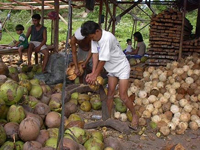|
Investment opportunities for the future: Coconut products for the 21st century - Part Two
In last week’s article we set out the pathetic status quo of the Sri Lankan coconut industry. But then, what am I doing writing an article on the coconut as an investment opportunity for the long term? Let me justify my commitment on several fronts.
Firstly, the gut feel of those in the know, supported by research and market trends in the global market show bright prospects for the industry. When recently asked, what areas he would wish investors to go into, the Minister of Coconut Industries Salinda Dissanayake’s instant reply was: “Go into virgin coconut oil!” Then only he went on to describe other areas that he feels investors should move into such as copra, coconut oil, coconut cream, coconut powder and dessicated coconut. And he added, “That list is only those made with the coconut meat,” meaning that there is a host of fibre based products and coconut shell based products that have a potential export market. For example, Haycarb Limited, with its international subsidiaries, is the world leader in activated carbon with a global market share of around 40 percent. And while they are importing coconut shells, there are measures under way to collect shells from Sri Lanka. The Minister of Coconut Industries corroborated that a mechanism is being put in place to collect shells which are thrown away in the cities and suburbs. Chairman of the Coconut Development Authority, D. J. U. Purasinghe agrees about the huge potential for virgin coconut oil. According to him, it fetches the highest price for coconut oil in the global market place. Virgin coconut oil is a colourless fluid extracted using a cold press process. It is used in food preparation and for cosmetic products, among other things. As the Minister explained, “if the virgin coconut oil you make is organic, there is an even bigger price premium to be had.” He added that one foreign investor, at least, is interested in making organic virgin coconut oil in Sri Lanka. Sri Lanka has already earned a reputation and a significant place in the global market as a producer of organic products. Companies like Lanka Organics have led the way in this area. Organic oil would come from nuts of coconut trees grown without resorting to artificial chemical fertilizers and pesticides. Since maintaining an organic farm is more costly, complicated and relatively more labour intensive, it is understood that the produce carries a price premium. People who appreciate the value of organics and of virgin coconut oil, the high end consumers and those who cater to them are willing to pocket this out. This is a potential lucrative sector to consider. Now, that kind of potential is one reason I am upbeat on the future of the coconut industry. On the other hand, Sri Lanka is estimated to be losing around 254 coconut trees a day to housing development and other infrastructure projects. While the outlook looks dismal, it certainly opens up huge opportunities for the long term investor. Why not invest in coconuts? After all, investing in trees is such a lucrative business. People invest in a few trees today expecting gains in the future. Touchwood, a firm offering trees as long term investment, is doing well and recently obtained listing in the Colombo Stock Exchange. I am by no means suggesting we look at coconut in the same way. But as Henry Nimal Appuhamy, the Head of Technology Transfer Division of the Coconut Research Institute says, “Most people do not realize the coconut sapling they plant grows to become a living asset capable of yielding at least Rs 35,000 over its lifetime.” And, he is counting just the value of nuts. Looking at it another way, the Touchwood approach is like paying money to adopt a kid by proxy, and have nothing to do with its upbringing. You benefit in the end. But with coconut, the approach is more like having your own child, which needs nurturing. It seems people prefer the easy way. But I wonder. Would the Sri Lankan entrepreneurs see the value of growing coconut as a long term investment? (To be continued next week.) Share with us your ideas on this topic. Send your comments and questions to ft@sundaytimes.wnl.lk. | ||||
Copyright © 2006 Wijeya Newspapers
Ltd. All rights reserved. |
